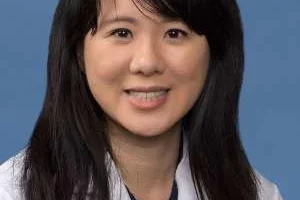News Stories
Medical Education Fellowships
Highlight stories from MEF alumni, faculty and current fellows from the MEF newsletter.

Katherine Fu, MD (MEF 1 ’21, MEF 2 ’22) Presents Mixed Methods Research on Resident Journal Club Formatting
After beginning her research on the efficacy of journal club formats back in MEF, Dr. Katherine Fu recently presented her research abstract, “A Mixed-Methods Approach to Teaching Critical Appraisal of Research to Neurology Residents Through Social Cognitive Theory,” last month at the American Academy of Neurology (AAN) Annual Meeting as an oral presentation.
For her project, Dr. Fu reexamined how journal clubs were structured for neurology residents at UCLA Health, comparing a “flipped" journal club format to a traditional journal club format to see which format was more effective at teaching critical appraisal skills to residents in the context of Social Cognitive Learning Theory as the conceptual framework. In the traditional model, a resident facilitator is selected to prepare a presentation on the designated journal club article for their fellow residents alongside a faculty member who would share their expertise. In the flipped model, instead of a presentation, the resident facilitator creates a discussion guide with discussion questions that residents of different PGY-levels are then assigned to prepare for prior to the journal club. During the journal club, all residents discuss the answers to these questions, alongside faculty guidance.
Research was performed using a mixed methods approach with both quantitative and qualitative components. For the quantitative phase, pre-, post- and delayed post-tests were administered to residents after each journal club session. Each test consisted of 10 multiple choice questions. Of these 10 questions, there were a portion of questions that tested methodology concepts and those that tested clinical application concepts. Scores were compared across the two journal club formats using a linear mixed effects model of the change in the outcome from pre- to post- with fixed effects for journal club format, pre-score, and test type. For the qualitative phase, we conducted ethnographic observations for each journal club session as well as one-on-one interviews with the residents to explore their experiences during each journal club format and how each of them facilitated learning.
For the quantitative phase, there was a 22% change in overall test scores in the flipped model between pre- and post-tests; whereas, there was only a 5% change in the traditional model. While post-test scores did improve overall for both formats, the degree of improvement in the flipped model was greater (p = 0.0278). Most of this change was driven by the clinical application questions. The methodology subscore analyses demonstrated no statistically significant difference across the two formats, whereas the clinical application subscore saw a 49% improvement in the flipped model and a a 1% improvement in the traditional model (p < 0.001).
For the qualitative phase, ethnographic observations noted similar demonstrations of attention across both formats and more consistent demonstrations of retention, reproduction, and motivation in the flipped format. For the interviews, thematic analysis demonstrated four key themes: 1) Residents acknowledge that adequate preparation is important, but finding time for this is challenging, 2) Clinical relevance and topic of the articles are primary motivators, 3) Passive listening occurred in both formats, with scripted interactions characteristic of the flipped format, and 4) Learning arises from faculty modeling of practicing evidence-based medicine.
In concluding her results, Dr. Fu found that while the flipped journal club did improve overall and clinical application sub-scores, related to the more discussion-based nature of the format, a number of improvements could still be made. Examples include reducing the burden of preparation needed for journal club in GME, highlighting the clinical relevance of topics, encouraging organic conversations, and improving faculty modeling of evidence-based practice. Finally, principles of andragogy appeared to predominant in the thematic analysis, moreso than social cognitive learning theory.
Future directions Dr. Fu’s research include expanding this study to include other programs for multi-institutional collaborations or testing alternative journal club formats, such as the "no-prep" format she and her team are piloting this year based on work by Dzara et al. in the pediatrics literature.
If you have questions regarding Dr. Fu’s research, she can be reached at KFu@mednet.ucla.edu.
To view her oral presentation deck, please click below.

Emily Hotez, PhD (MEF 2 ’23) Launches CME Course
In part with her MEF 2 research this past year, Dr. Emily Hotez recently launched the on-demand, virtual CME course, Intellectual and Developmental Disabilities: Promoting Health and Well-being, an accredited healthcare provider training for promoting health and increasing uptake, access, and confidence of all vaccines—including the COVID-19 vaccine—among individuals with disabilities and their families.
As both a developmental psychologist and sister of an autistic adult, Dr. Hotez writes, “I am both professionally and personally committed to designing medical education curricula that can better support the health and well-being of marginalized populations, including individuals with disabilities. Throughout my sister’s life course, I witnessed firsthand the downstream effects of lack of healthcare provider knowledge and confidence in supporting this population. This CME is a small example of a strategy to address shortcomings in medical education surrounding disabilities.”
While this particular CME focuses on promoting vaccine confidence among individuals with disabilities, Dr. Hotez believes the strategies and resources highlighted in the training will support healthcare providers serving all populations. She says her current priority for the course is to enroll UCLA residents to ensure they feel equipped to promote vaccine confidence as they begin their journey as physicians.
Dr. Hotez also intends to use the robust research and evaluation strategy embedded into the CME during her time in MEF 2 to better understand the course’s contribution to medical education and make adjustments for future projects. Regarding MEF, Hotez noted, “It was extremely valuable to have the opportunity to learn from my peers and experts in the field through the fellowship.”
In addition to launching the CME, Dr. Hotez adds, “MEF also supported me in participating in the Harvard Macy Program for Educators in Health Professions, which has allowed me to engage with and collaborate with experts in medical education from around the world. Taken together, MEF served as a launchpad for my career in medical education research and evaluation.”
Dr. Hotez welcomes any DGSOM collaborators interested in developing and evaluating equity-focused medical education curricula and looks forward to learning more about ongoing initiatives and avenues for collaboration. She can be reached via email at ehotez@mednet.ucla.edu.
Information on the CME Course
- Course Fee: Free
- Course Release Date: 09/01/2023
- Course Termination Date: 09/01/2026
- Content: Access to all three modules, videos, and valuable resources.
- Accessibility: Review modules anytime and anywhere. Modules are delivered via a streaming platform in the optimal format for your electronic devices.
- Accreditation: This enduring material activity has been approved for AMA PRA Category 1 Credit™.
Questions? Email ccpd@mednet.ucla.edu or call (310) 794-2620.